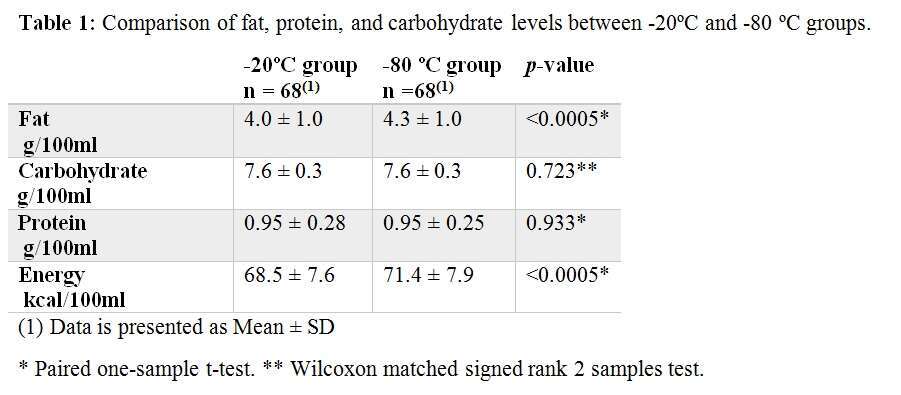Background: Long term storage of human milk (HM) requires freezing at low temperatures, the consequences of which upon macronutrients are unclear. There are only few studies on freezing-induced changes in HM nutrients content with conflicting results. We aimed to examine differences in macronutrients content of long term stored HM at -20°C compared to -80°C.
Methods: Mature HM samples from 25 mothers of term and preterm infants were collected. Each sample was divided into 6 aliquots for storage at freezing conditions of -20ºC and -80ºC for 4, 12 and 24 weeks. After thawing and homogenization, energy and macronutrient contents were measured using infrared spectroscopy analyzer.
Results: A total of 150 HM samples were analyzed. The final analysis was performed on 137 samples with validated results, table 1. Fat and energy contents were consistently higher in the -80°C samples compared with the paired -20°C samples at each of the time points (p<0.05). Comparing the differences in macronutrient content over time (4 weeks versus 24 weeks) revealed a significant loss of fat (0.3 g/100 ml (=7.9%), p=0.001) and energy (2.3 kcal/100 ml (=3.3%), p=0.03) in the -20°C group. In the -80°C group, fat and protein were found to be significantly decreased over time (fat: 0.14g/100 ml (=3%), p=0.009; protein 0.06g/100 ml (=6.4%), p=0.02).
Conclusions: Long-term storage of human milk at -80°C is associated with fat and energy preservation compared to storage at -20°C. The results of our study may help construct evidence based recommendations and guidelines for HM storage.

